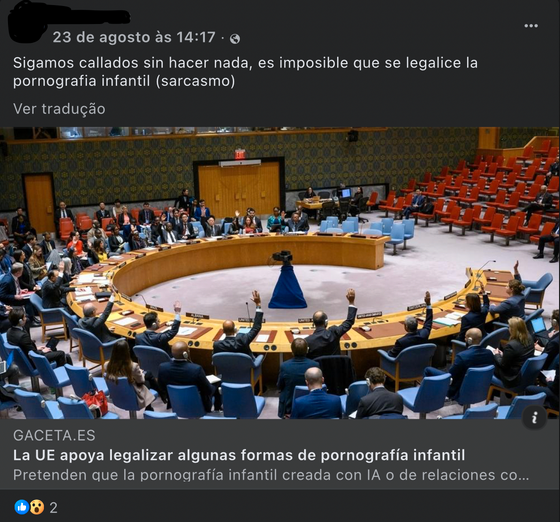Several publications claim that the EU supports the legalization of practices such as sexting or the creation of fictitious sexual content involving minors. But what was proposed is something different.
Several posts circulating on the social network Facebook allege that the European Union supports the legalization of “certain forms” of child pornography. “Let’s keep quiet, without doing anything, it is impossible to legalize child pornography (sarcasm),” can be read in one of the publications, as a comment to an article in a Spanish newspaper that goes in the same direction.
In the article in question, published by La Gaceta de la Iberosfera (Spanish digital newspaper financed by the Disenso Foundation, considered the ideological platform of the far-right political party Vox), one can read that the European Union and the United States are trying to advance toward the decriminalization of what the newspaper calls “certain forms of child pornography,” which includes sexualized material that does not involve a “real child,” is generated autonomously—through artificial intelligence—or is created within a “relationship.” consensual” and preserved for “private use.”
According to the article, the proposal made by some Western countries, during the negotiations of a new treaty on cybercrime at the UN (which are ongoing) was that, in the cases mentioned above, each country could decide to open criminal proceedings against the perpetrators. of the videos, making the criminal process optional. Currently, there is a global consensus for these situations to be treated as a crime of child pornography, in line with the principles explained in the United Nations Convention on the Rights of the Child.
An Austrian delegate, for example, justified that “children over 14 years of age have the right to have sexual relations,” adding that these minors can create and share images in the context of voluntary and legal sexual relations, without these images having to be criminalized. “Children of this age can choose to have a sexual relationship with someone who is 19 years old, that is, an adult,” the delegate said, referring to Austria’s national laws.
The same delegate highlighted that “children can take photographs during sexual intercourse and share them among themselves.” “It is our conviction that images produced as part of a legal and voluntary relationship should not be criminalized,” he argued. A position that was also supported by the representative of the European Union, who stated that the exceptions introduced in Chapter 14 of the treaty (see here) are the “minimum requirements to avoid the overcriminalization of some legitimate conduct involving children.” The same delegate added that “there would be no way for the countries of the European Union to sign the convention” without the presence of the exceptions already mentioned, since the practices in question are, he highlighted, considered legitimate in some EU countries.
For Observer, a European Commission source denies the idea that the bloc of 27 advocates the legalization of some forms of child pornography. “The Commission vehemently rejects any accusation of this type,” says an official source.
The Commission highlights that “combat violence against children, both online as offline“It is a priority”, recalling that the issue was mentioned by the elected president Ursula Von Der Leyen “in her political guidelines for the next Commission”, which the German will once again preside over. Thus, “during the negotiations in New York for the UN Convention on Cybercrime [a postura da Comissão] It was no different,” highlights the organization, recalling the commitment previously made by Von Der Leyen to “combat the growing trend of abusive behavior online with an action plan against cyberbullying.”
The idea that the European Union supports the legalization of “some forms” of child pornography is wrong. What the countries of the European Union (and also the US) proposed at the UN was not precisely the legalization of “certain forms of child pornography”, but the end of the mandatory criminalization of some practices, leaving the penal system of each country has the possibility of deciding to open criminal proceedings.
Conclusion
The European Union has not proposed the legalization of “certain forms of child pornography.” A source from the European Commission “vehemently” rejects accusations of this type and guarantees that combating violence against children is a priority.
What the EU proposed was the end of the mandatory criminalization of some practices, leaving the penal system of each country the possibility of deciding whether to open criminal proceedings. Furthermore, in EU countries the practices in question (creation of fictitious sexual material involving children and possession for private use of sexual material involving children in the context of a consensual relationship – so-called sexting) are two legitimate practices. .
Thus, according to the Observer classification system, this content is:
MISTAKEN
In the Facebook classification system this content is:
FAKE: Claims about the main content are factually inaccurate. Generally, this option corresponds to “false” or “mostly false” ratings on fact-checking websites.
NOTE: This content was curated by Observador as part of a fact-checking partnership with Facebook.

Source: Observadora
